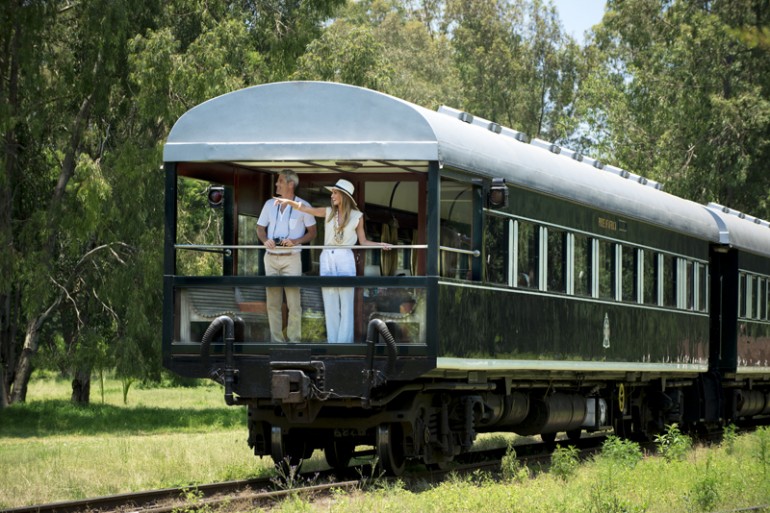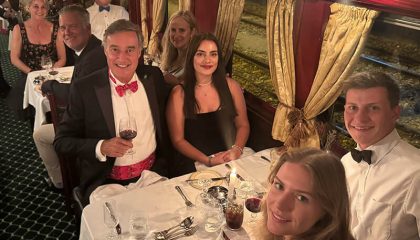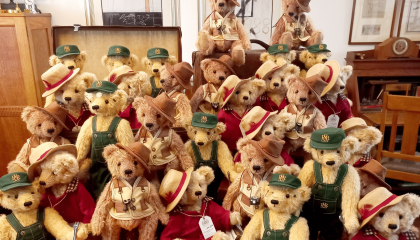The Luxury of the Slow Lane
We recently hosted journalist, Eugene Yiga, on board one of our Cape Town journeys and we’re still talking about what a lovely gentleman he is! Thank you for travelling with us Eugene and thank you too for the articles you’ve written, the most recent being for Business Day Live.
Rovos Rail bring back luxury of slow lane
The dinner gong sounds. Is it 7.30pm already? I can’t believe I’m going to be late because I can’t choose a tie. Why did I pack so many? And why can’t I remember how to make a knot?
I put on my jacket and head down the passage, unsure for a moment whether I’m going the right way. Then I arrive at the table, take a seat and sigh in relief. My rushing thoughts are forced to quiet when I find myself captivated by the scene.
This is the dining carriage of Rovos Rail, recently voted by Wired.com as one of the seven most luxurious train in the world. My first impulse is to reach for my phone — not to distract myself with a podcast or an e-book, but to take photographs of the crystal wine glasses, the silverware and the rest of the luxurious scene.
The same impulse strikes when the first course arrives. Given my work as a writer, the standard procedure would be to “compose” the plate, angle the camera, take the picture, crop, filter, tag, tweet and post. Then there’d be endless refreshing in the hopes of “likes” and retweets, all the while hoping the food would still be warm when I took my first bite.
But it’s different here. With no phones allowed at meals, all I can do is sit back and savour the highlights that never fail to impress. Balsamic and lemon-marinated slices of ostrich fillet served on a potato, beetroot, walnut, and watercress salad. Grilled Cape rock lobster tails with a haricot-flavoured bisque cream, Mediterranean vegetables, and lemon rice. Garlic and lemon grilled prawn skewer on a green salad, with a julienne of peppers, mange tout, and cucumber, drizzled with coriander and ginger dressing.
Alone with my thoughts, I wonder about our tendency to document every moment with our smartphones, instead of just experiencing them for what they are. Are we trying to make our Facebook friends jealous of what we remember or are we afraid of what we might forget? And are we, as Om Malik wrote in The New Yorker, a society that photographs everything, but looks at nothing?
At the end of the meal, as many jetlagged passengers retire to their suites with weary smiles and polite nods, I sip on mint tea, grateful that a single dinner seating on all Rovos Rail train trips means no rushing guests out to prepare for the next group. My thoughts turn to the nature of our journeys through life, which has been on my mind since my 30th birthday two days before.
I look out the window and see an airplane overhead, its lights flashing like a pulse against the night sky. I wonder about the passengers travelling the same distance in two hours that I’ll do in two days. And I reflect on the stress of my most recent flight: repacking bags at the counter, breathing artificial air that almost made one sick and experiencing turbulence so severe that all I could do was laugh.
Of course, road journeys are no better when you consider that a bus is like a smaller, slower plane and a car is like a smaller, faster bus. You might not be next to the understandably frazzled mother and her screaming twins or the overweight man and his overpowering cologne, hogging the armrest and disturbing your nap every time he opens another bag of chips.
You might even remember to pack your own food, lest you waste money on stale petrol station pies. But with traffic jams causing delays and the physical stress of driving, you end up just as tense.
But life is different on the train. With an average speed of just 45km/hour, there’s no rush to get from Point A to Point B. It doesn’t even matter that there are often delays outside the operator’s control — they share tracks, after all — because it’s easy to make up the time later. Besides, it’s not like anyone notices. All that matters to me and the 35 other passengers is using the journey as an opportunity to press pause.
And so, after leaving Pretoria on Friday afternoon, touring Kimberley on Saturday, and visiting Matjiesfontein on Sunday, we approach Cape Town. As we enjoy our final afternoon tea in the observation car, the international guests gasp and point, their cameras out to capture what they’ve been waiting for. It’s Table Mountain and their excited expressions are much like the one I had when I saw the Pyramids of Giza for the first time. But I can’t share in their joy because the moment I’ve been dreading is upon me. Cellular signal is back.
My phone spasms, tempting me to attend to it the way it always does. I take one look at the screen’s cluttered notifications and set the device to flight mode to enjoy a few more moments of peace. Even when we arrive at Cape Town station, and I’m taking a short Uber trip home, the city I’ve lived in for 12 years feels brand-new.
Journey over, I continue to wonder why we’re always rushing from one moment to the next; moving and chasing and striving instead of just slowing and stopping and being.
Why are we so afraid to be still, alone with nothing to distract us but our thoughts?
And why did this weekend journey, out of all the experiences I’ve been fortunate to have, leave me feeling so blissed out? Perhaps it’s because, as the modern world continues to yank us into the future at an ever faster pace, taking time out to slow down and relax is the greatest luxury of all.
To contact Eugene, visit his website or e-mail him on hello@eugeneyiga.com





